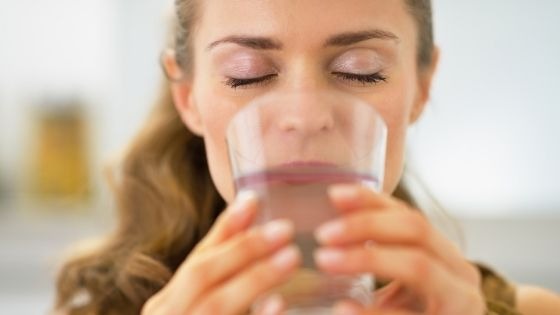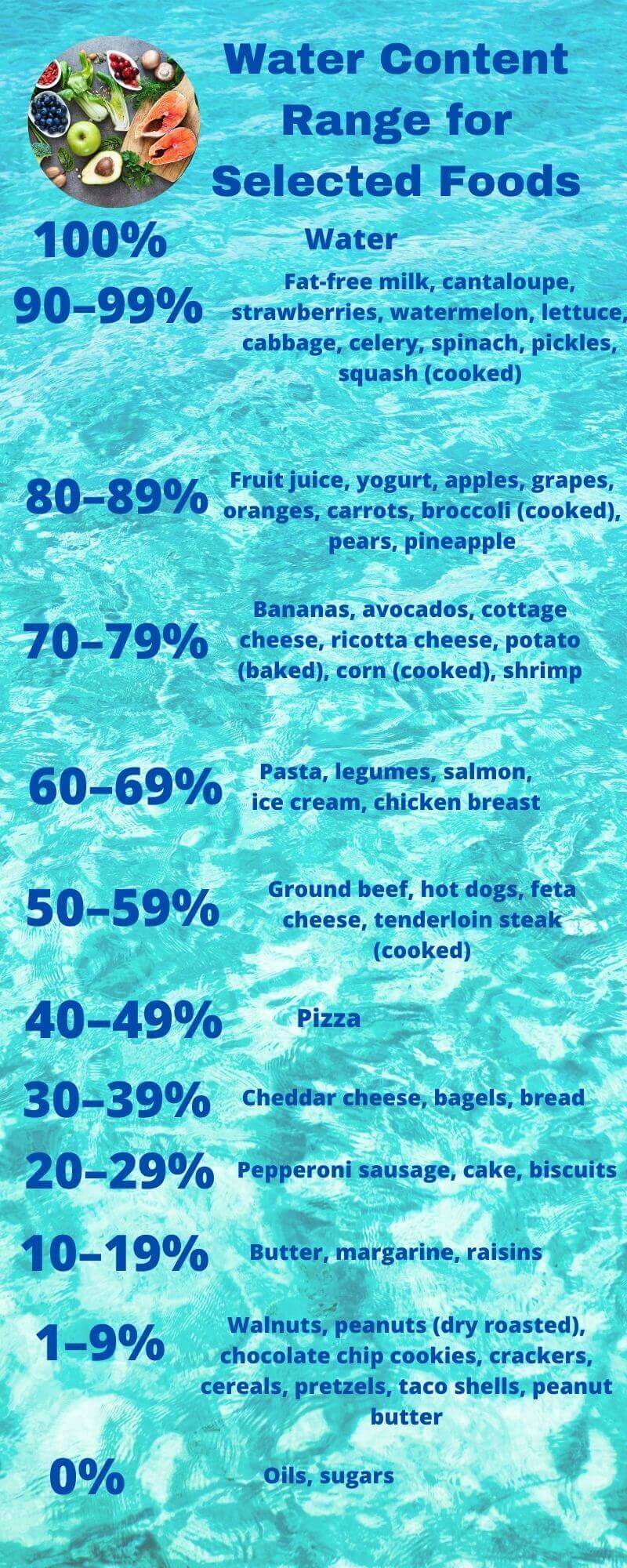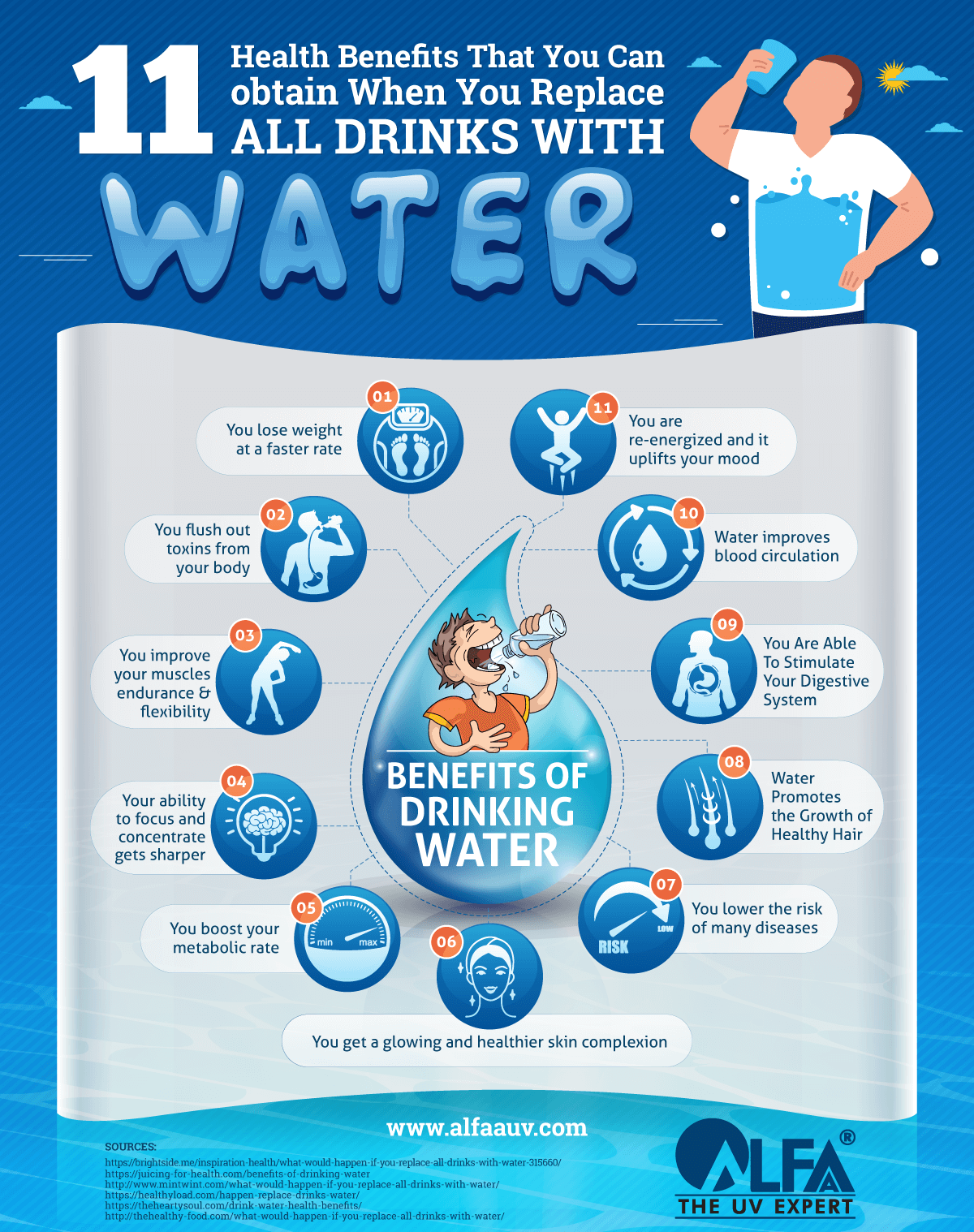Why is it important to drink water?

We all know that it is essential to have correct hydration and drink water, but why is it so important?
Drinking water helps us maintain physical and cognitive functions, regulate body temperature, and improve digestive processes. Also, water benefits the lubrication of joints, cartilage, and tendons. It also provides structural support to muscle tissue and facilitates the elimination of toxins.
Water has many essential functions to maintain a good state of health. Water is the main component of our organism and is vital for life since it intervenes in many physiological processes.
During the day, we are continually losing water through urine and breathing or sweating. We have to replace this water that we lose if we want to have the right balance in our organism. To achieve this balance, we have to drink regularly.
Our bodies are losing about two and a half liters of liquids throughout the day.
How much water should a dehydrated person drink a day?
In the case of women, the total daily intake of liquids should be 2 liters, and in the case of men, it should be two and a half liters. 80% of water intake should come from water and the remaining 20% from food such as fruits or vegetables or other drinks such as broths or infusions.
In no case would we talk about alcoholic drinks or sweetened drinks such as soft drinks. It would be best if you considered that these recommendations are standard, but then there are variations depending on each person according to their age or even the temperature outside.
The water content of the most common foods chart
| Food | Water percentage |
| Water | 100% |
| Skimmed milk, melon, strawberries, watermelon, lettuce, cabbage, celery, spinach, pickles, pumpkin (cooked) | 90-99% |
| Fruit juice, yogurt, apples, grapes, oranges, carrots, broccoli (cooked), pears, pineapple | 80-89% |
| Bananas, avocados, cottage cheese, ricotta cheese, potato (baked), corn (cooked), shrimp | 70-79% |
| Pasta, vegetables, salmon, ice cream, chicken breast 60-69%. Minced meat, hot dogs, feta cheese, tenderloin steak | 60-69% |
| Minced meat, hot dogs, feta cheese, tenderloin steak | 50-59% |
| Pizza | 40-49% |
| Cheddar cheese, bagels, bread | 30-39% |
| Pepperoni sausage, cake, biscuits | 20-29% |
| Margarine, butter, raisins | 10-19% |
| Nuts, peanuts (dry roasted), chocolate chip cookies, crackers, cereals, peanut butter | 1-10% |
| Oil, sugars | 0% |
Source: The USDA National Nutrient Database
You may be interested in "The 22 best foods for our health according to science."

How can I drink 8 glasses of water a day?
Most people drink when they are thirsty, but we have to consider that thirst is a warning signal sent by the body. The sensation of thirst appears when we have lost 1% of our liquids. Although this 1% may not seem much to us, it already diminishes our cognitive capacities and physical performance. Therefore, it is better not to wait until we are thirsty to drink.
The right water intake frequency would be 330 milliliters, a small mineral water bottle every two hours. The most advisable thing is to drink it slowly, in small sips and preferably fresh, at about 10-15 degrees to be better assimilated. If you usually forget to drink water regularly, you can have a more marked pattern throughout the day.
For example, propose yourself:
- Drink one or two glasses of water when you wake up, also in small sips. That will activate the body slightly, both the intestines, the circulation, and the blood flow.
- During the main midday and evening meals, one or two more glasses. That will also help you improve your digestion and assimilation of food.
- Before going to bed, the last glass of water will help you better regulate your blood pressure and avoid muscular rigidity at the end of the day.
Many people always carry a small bottle of mineral water to drink throughout the day. That is a great way to achieve optimal hydration. The bottled mineral water that we can find in almost any establishment is water with many qualities.
Besides, it is protected from any contamination and is bottled at the source, preserving its purity and properties. It also maintains a constant composition of minerals and trace elements.
Why is drinking water important?
Did you know that nearly 60% of your entire body weight is water? Not 5, 10, or 20% but 60%. That is fascinating, but there are still people who do not consider water important.
Scientific studies have shown that water has a life of its own, and believe it or not, this is true. Luc Montagnier, a French scientist who won the Nobel for his discoveries about HIV/aids, also conducted impressive water experiments.
This scientist showed the world that water does have a life of its own by demonstrating a series of very detailed scientific experiments that water can hold information and benefit or harm us.
In these experiments, Luc Montagnier demonstrated, for example, that homeopathy is medical science. Water can carry impressive healing properties, which is only one reason why drinking water daily is so essential to keep us healthy.
It helps prevent many diseases.
Water prevents many diseases. If you do not drink 4 to 8 glasses of water a day, you are at risk for many health problems. Our body needs water to meet its daily demands because it is constantly losing it.
Every minute we lose water, and we don't notice it. For example, it leaves the body in the form of sweat, steam, during breathing, in the urine, etc.
- Constipation. For example, a widespread health problem caused by dehydration is constipation. People who do not drink enough water have issues going to the bathroom because they need water to move the foods through the digestive system.
- Cancer. Another health problem that can arise from low water consumption is cancer. Some studies have shown that low water consumption can be a risk factor for bladder and colon cancer.
- Kidney stones. Kidney stones are another widespread health problem that can develop from insufficient water intake. There is an increased risk of kidney stones forming if you do not drink enough water.
You may be interested in "How to get rid of water retention naturally? "
It helps you lose weight.
Water helps us to lose weight; this is something that all women know. Drinking water helps us to lose weight because drinking water can help speed up metabolism and, at the same time, reduce the appetite.
According to a study carried out by Dr. Simon N. Thornton, for the journal Frontiers of Nutrition, he demonstrated that increasing water intake could significantly increase our metabolism.
Another study published in The Journal of Clinical Endocrinology & Metabolism estimated that drinking two liters of water per day can also increase energy consumption by almost 400 calories per day. Also, drinking cold water forces the body to expend more calories to heat the water to match our body temperature.
Finally, if we drink water before meals, we may even experience very rapid weight loss when combined with a healthy diet.
You may be interested in "How many calories should you eat per day to lose or gain weight? (With calculator and menus)"
It prevents headache
Drinking water also prevents and helps treat headaches. If you don't already know, you can drink water as well to prevent and treat headaches.
Many people who suffer from migraines and headaches also suffer from dehydration. Several studies have shown that drinking water can relieve headaches in those suffering from it or who are constantly dehydrated.
A study by Drs. Amy Price and Amanda Burls found that drinking water frequently can reduce the frequency and duration of a headache or migraine.
Water increases our energy levels.
Believe it or not, drinking water increases our energy levels. A scientific study published in the journal Nutrition Reviews showed that the body's hydration strongly influences our bodies and brains.
If we are dehydrated, this can affect many aspects of our energy levels and brain function.
Women who have a more significant loss of fluid after exercise have an easier time altering their mood, concentration, and headaches frequency. Mild dehydration can also decrease mood, memory, and brain performance.
That happens regardless of age, from children to the elderly. Hydration? It seems increasingly clear that the equation "health + normality without excess = beauty + happiness" is the right algorithm to achieve what, after all, every one of us is looking for. It happens then that nobody at this point can surprise you too much, if here and now, I sing my particular to the virtues that correct hydration has on our health.
The benefits of hydration
- Hydration improves the condition of the joints.
- Also that of the mucous membranes.
- It allows the correct elimination of toxins.
- It directly benefits our skin and its appearance, maintaining its elasticity, tone, and softness.
Drink what your body needs
However, what I propose from these lines is not to claim the obvious, but to dismantle some false myths surrounding the intake of liquids and hydration itself. Besides, I am beginning to get a little tired of listening to or reading about it in various media.
You know, the typical model whose only beauty secret always seems to consist of eating everything and drinking 4 liters, minimum, of mineral water daily.
I think it is fascinating to know that, although it is true that an adult human being, who does not do any physical activity, needs about two liters of liquid daily to maintain their hydration levels in a correct margin.
It is also true that most of the food we eat has a high percentage of water in its composition. Moreover, with a balanced diet, it is unnecessary to drink so much water, and if we finally do, we could incur an over-hydration problem.
I leave you more information about the dangers of overhydration here.
In most cases, it will not have a more significant consequence than visiting the bathroom more often than usual. Depending on how much we overdo it, it could lead to more severe conditions, especially for those who retain liquids.
Health Benefits That You Can Obtain When You Replace All Drinks With Water[Infographic]
Conclusion
That said, use common sense and fulfill our algorithm's maxim: "normality without excess." Remember that a healthy person with good kidneys, a good heart, and hypothalamus (which is where the thirst center is in the brain) should not drink much more than thirst.
